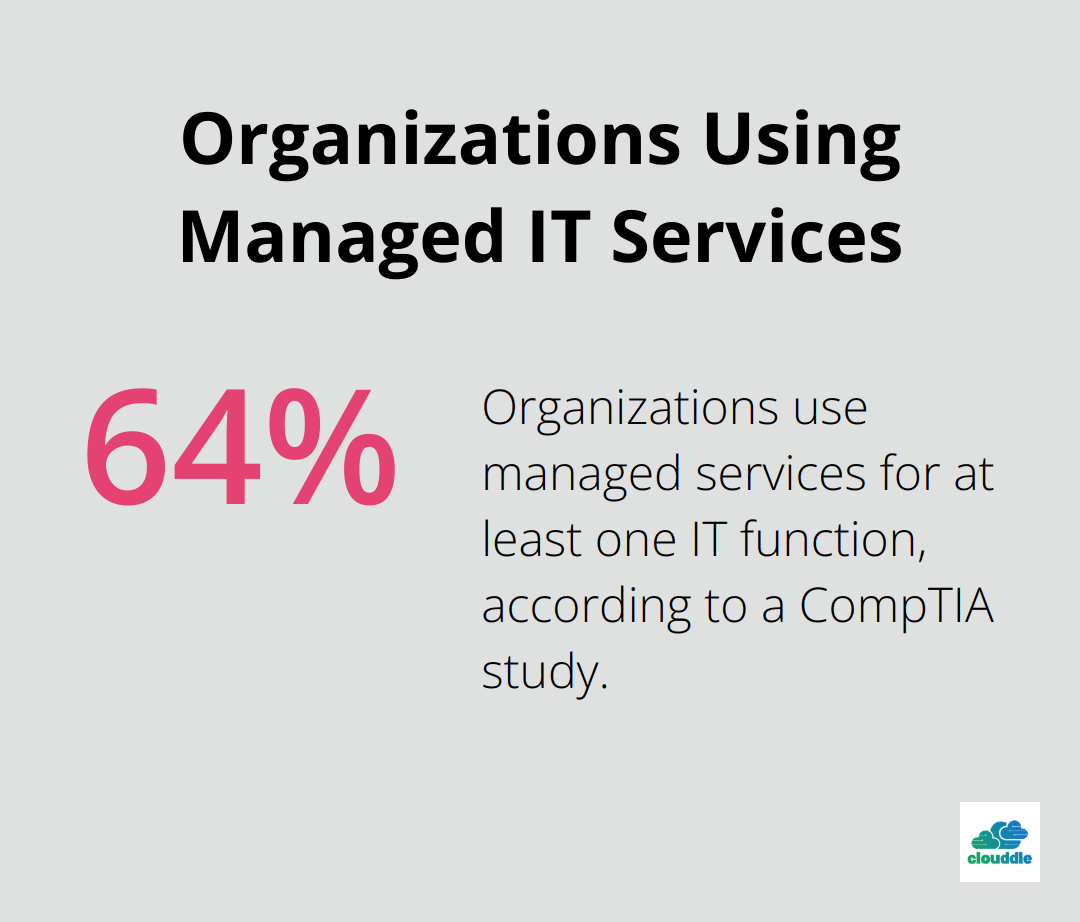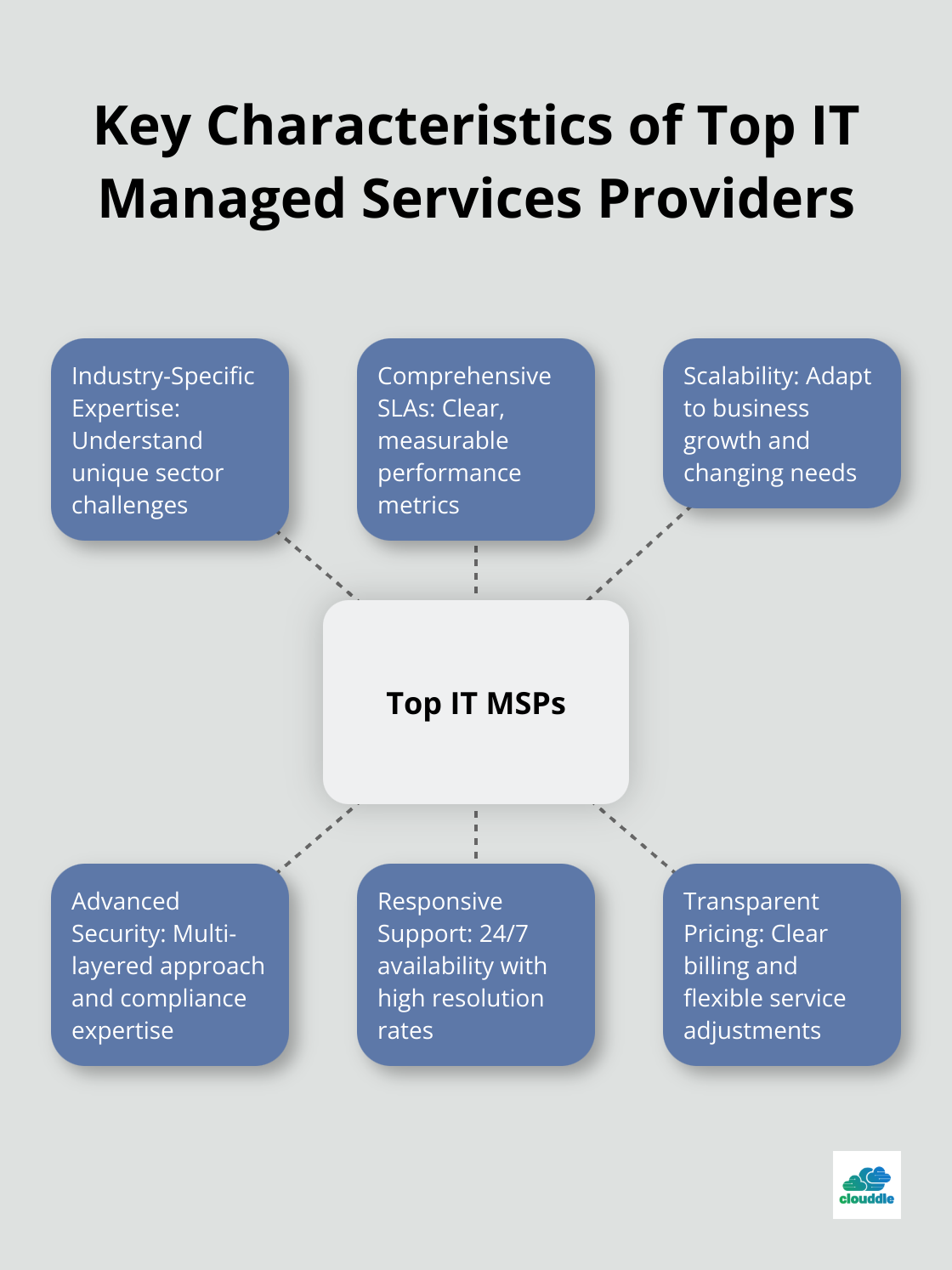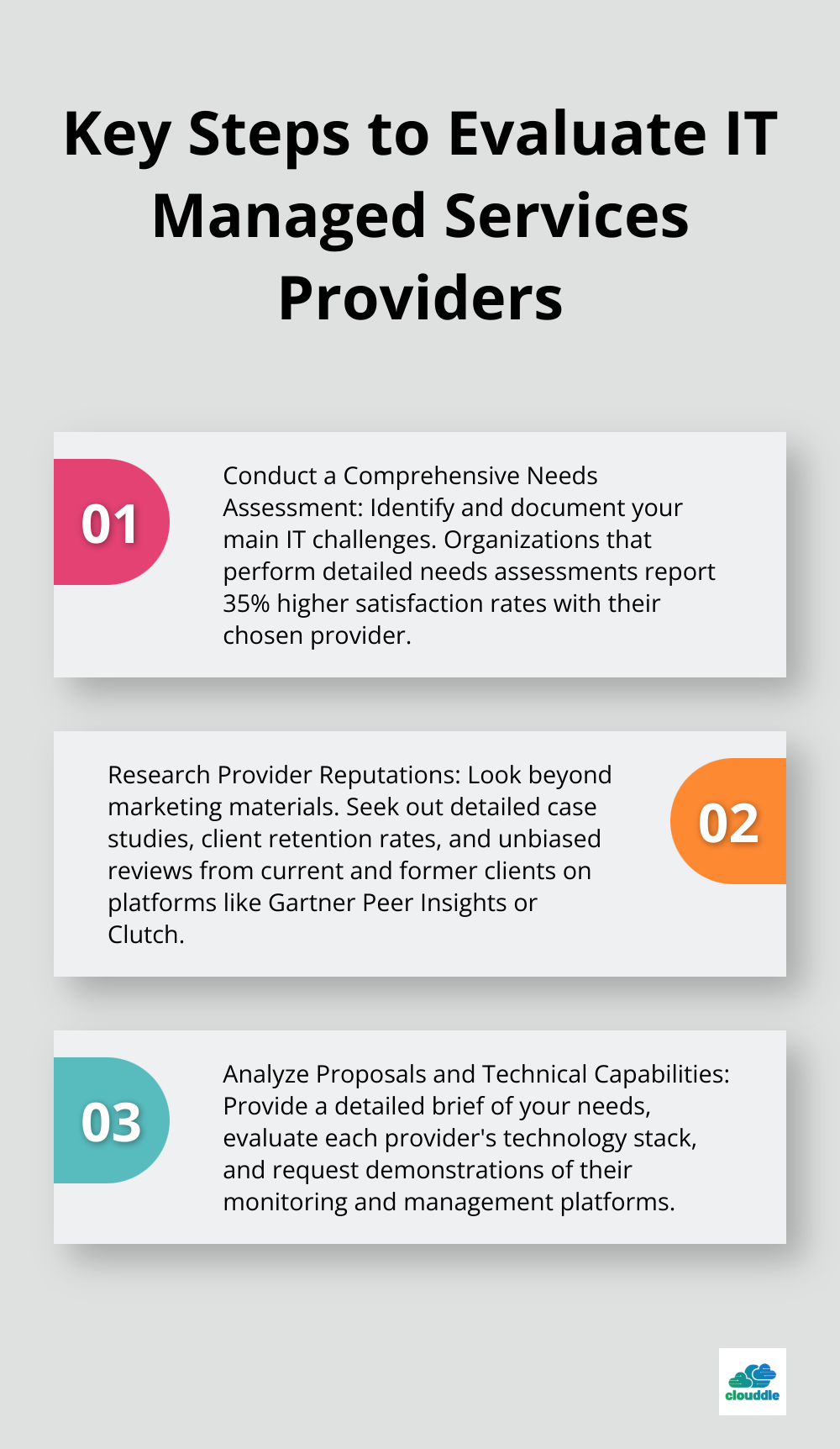Choosing the right IT managed services provider can make or break your business operations. At Clouddle, we’ve seen firsthand how partnering with top IT managed services providers can transform a company’s efficiency and security.
In this guide, we’ll walk you through the essential factors to consider when selecting an IT managed services partner. We’ll also provide practical tips to help you evaluate potential providers and make an informed decision that aligns with your business needs.
What Are IT Managed Services?
Definition and Scope
IT managed services revolutionize business operations by outsourcing technology infrastructure management to specialized providers. These services encompass a broad spectrum of offerings, including network monitoring, cybersecurity, cloud services, data backup and recovery, and help desk support. Some providers expand their portfolio to include VoIP solutions, software-as-a-service (SaaS) management, and IT strategy consulting.
Nearly two-thirds (64%) of organizations are using managed services for at least one IT function, according to a 2105 CompTIA study of technology buyers, highlighting the growing trend of professional IT management adoption.

Benefits of Outsourcing IT Management
Businesses choose managed services for several compelling reasons:
- Focus on Core Activities: Companies can concentrate on their primary business functions without the distraction of technical issues.
- Cost-Effectiveness: Access to a team of experts comes at a fraction of the cost of maintaining an in-house IT department.
- Expertise and Resources: Managed service providers offer specialized knowledge and cutting-edge tools that might be out of reach for many businesses.
Practical Considerations for Businesses
When evaluating IT managed services, businesses should:
- Assess Specific Needs: Identify pain points (e.g., frequent downtime, security breaches, slow response times) to guide provider and service selection.
- Consider Scalability: Choose a provider that can adapt services to evolving business requirements, ensuring long-term success.
- Evaluate Provider Expertise: Look for providers with experience in your industry and a track record of successful implementations.
Types of IT Managed Services
The landscape of IT managed services is diverse, catering to various business needs:
- Network Infrastructure Management: Ensures optimal performance and reliability of network systems.
- Cybersecurity Services: Protects against threats and ensures compliance with data protection regulations.
- Cloud Services Management: Oversees cloud-based applications and infrastructure, optimizing performance and cost.
- IT Support and Help Desk: Provides technical assistance to end-users, resolving issues promptly.
- Data Backup and Disaster Recovery: Safeguards critical business data and ensures business continuity in case of emergencies.
As businesses navigate the complex world of IT managed services, they must carefully evaluate their options. The next section will explore key factors to consider when choosing an IT managed services provider, helping you make an informed decision that aligns with your business objectives.
What Makes a Top IT Managed Services Provider?

Industry-Specific Expertise
Top IT managed services providers excel in industry-specific knowledge. For example, hospitality sector MSPs should understand hotel management systems and guest Wi-Fi solutions. This expertise allows providers to offer tailored solutions that address unique challenges in each sector.
Comprehensive Service Level Agreements
A robust Service Level Agreement (SLA) forms the foundation of a successful partnership. Leading providers offer clear, measurable performance metrics. When evaluating SLAs, look for:
- Guaranteed uptime percentages (99.99% is the industry standard)
- Specific response times for different severity levels
- Defined escalation procedures
Avoid vague promises and insist on concrete commitments from potential MSPs.
Scalability and Future-Proofing
Your IT needs will change over time. Select a provider that can adapt to your growth. Ask potential MSPs about their capacity to handle sudden demand spikes or support expansion into new markets.
Advanced Security and Compliance Measures
Cybersecurity threats evolve constantly. Top MSPs stay ahead with multi-layered security approaches. Evaluate providers based on their offerings:
- Advanced threat detection systems
- Regular security audits
- Compliance expertise relevant to your industry (e.g., GDPR, HIPAA)
Responsive Customer Support
The true test of an MSP often occurs during critical incidents. Assess providers based on their support structure:
- 24/7 support availability
- Average resolution time for critical issues
- First-call resolution rates (top providers often exceed 80%)
- Customer satisfaction scores (aim for over 95%)
Transparent and Flexible Pricing
Pricing models should align with your business needs. While per-user or per-device pricing is common, some providers offer value-based pricing tied to business outcomes. Watch out for hidden fees or long-term lock-ins. The best MSPs provide clear, itemized billing and the flexibility to adjust services as your needs change.
As you evaluate potential IT managed services providers, consider how well they align with these key factors. The next section will guide you through the process of assessing and comparing different providers to find the perfect match for your business.
How to Evaluate IT Managed Services Providers

Conduct a Comprehensive Needs Assessment
Start your evaluation process with a thorough analysis of your current IT infrastructure. Identify and document your main IT challenges. Are you experiencing frequent system outages? Do you have concerns about your cybersecurity measures? Is your cloud management inefficient? Prioritize these issues to create a clear roadmap for evaluating potential Managed Service Providers (MSPs).
A 2023 Gartner study revealed that organizations which performed a detailed needs assessment before selecting an MSP reported 35% higher satisfaction rates with their chosen provider. This statistic underscores the importance of understanding your requirements before initiating your search.
Research Provider Reputations
Look beyond marketing materials when researching potential MSPs. Seek out detailed case studies that showcase the provider’s ability to solve problems similar to yours. Pay attention to client retention rates (top MSPs often maintain rates above 90%).
Use platforms like Gartner Peer Insights or Clutch to read unbiased reviews from current and former clients. Look for recurring themes in feedback, both positive and negative. Consistent mentions of specific strengths or weaknesses likely provide an accurate picture of the provider’s performance.
Analyze Proposals and Technical Capabilities
When requesting proposals, provide a detailed brief of your needs and expectations. This approach allows MSPs to tailor their offerings and provides you with a solid basis for comparison. Don’t hesitate to ask for clarification on any points that seem unclear or confusing.
Evaluate each provider’s technology stack. A strong provider should use cutting-edge tools and have partnerships with leading tech companies. Ask specific questions:
- What tools and technologies do they use for network monitoring, security, and cloud management?
- How do they handle data backups and disaster recovery?
- What’s their approach to proactive maintenance versus reactive problem-solving?
Request a demonstration of their monitoring and management platforms. This gives you a firsthand look at how they’ll manage your IT infrastructure.
Verify Certifications and Partnerships
Industry certifications and partnerships indicate an MSP’s expertise and commitment to staying current with technology trends. Look for certifications from major tech vendors like Microsoft, Cisco, and VMware. For example, a Microsoft Gold Partner status demonstrates a high level of expertise in Microsoft technologies.
Check for industry-specific certifications as well. If you operate in the healthcare sector, an MSP with HITRUST certification shows a deep understanding of healthcare data security requirements and improves external stakeholder confidence.
The goal isn’t to find the MSP with the most certifications, but rather the one whose expertise aligns best with your specific needs. An MSP with fewer, but highly relevant certifications might be a better fit than one with a long list of unrelated credentials.
Assess Customer Support and Response Times
Evaluate providers based on their support structure:
- 24/7 support availability
- Average resolution time for critical issues
- First-call resolution rates (try to find providers with rates exceeding 80%)
- Customer satisfaction scores (aim for providers with scores over 95%)
Request information about their escalation procedures and guaranteed response times for different severity levels. Top MSPs will provide clear, measurable performance metrics in their Service Level Agreements (SLAs).
Final Thoughts
Selecting the right IT managed services provider will significantly impact your business’s efficiency, security, and growth potential. Top IT managed services providers offer scalable solutions, transparent pricing models, and a proven track record of success in your industry. A thorough evaluation process includes assessing your needs, researching provider reputations, and analyzing proposals and technical capabilities.
A top-tier provider can transform your IT infrastructure, enhance your cybersecurity posture, and free up valuable resources. They become an extension of your team, providing expertise and support that can drive innovation and competitive advantage. The impact of choosing the right IT managed services partner cannot be overstated.
Take action today to find the IT managed services provider that aligns with your business goals. Clouddle’s comprehensive solutions for industries such as hospitality, multi-family dwelling, and senior living exemplify many qualities of top IT managed services providers. Invest time in this decision-making process to set the foundation for a more secure, efficient, and technologically advanced future for your organization.


